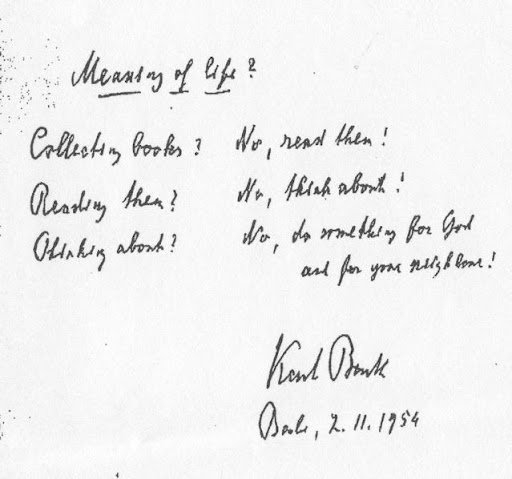What Really Matters?
Over the past two or three weeks, in conversations and visits with ministers and other church leaders, several themes and questions have emerged. The themes raised are pertinent, and the questions demonstrate the urgency present in many congregations. Yet often the focus of those questions can attend to the surface level concerns and not get to the central core of what is needful for robust congregational life.
On the wall of my study is a photocopy of the flyleaf of a book that Karl Barth gave to a friend:
Book lovers need such a reminder—and perhaps those of us who love the church will need to move beyond our concerns about worship service alterations, new signage, or finding the best youth minister in the country. That is not because worship, signage, or strong youth ministry are not important; rather, the energy that congregations exert over nearly endless debate about worship renewal, real estate, or youth ministry philosophy keeps us from the one thing that really matters.
Your church’s list of “things we are discussing” may differ from the following list, but here are some of the things that I get a lot of questions about these days: worship styles, aging populations, lack of young adults, the appropriate roles for women and men in congregational life, leadership models, LGBTQ conversations, lack of intergenerational relationships in congregations, and various concerns about the future. The list is a big one. Certainly, each of those concerns is important. Yet, such concerns create a cloud that keeps leaders from asking about the one thing that really matters.
So what is the one thing that really matters? The gospel is what matters. Sadly (and yes, I’m fixin’ to preach a sermon), way too many churches and leaders have decided that we know what the gospel is and have put the idea of the gospel on the shelf and moved on to other things—like the list of things named above. Two flaws emerge from such an action. The first flaw in making that move is that we have failed to understand the content of the gospel. And the second flaw is that we have ignored that the gospel is for us.
Let’s explore a bit here. A few short paragraphs will fail to say what fully needs to be said about the gospel—yet I will try. Taking a cue from the book of Acts, where declarations of the gospel make up the many sermons and speeches found there, I would simply say that the gospel is the narrative of Jesus’ story, emerging from the prophetic witness of the Old Testament, declaring that Jesus is the risen Lord and the coming One to put all things right. Jesus is the bold promised One whose presence declares that God is with us. And this good news is to be received in faith and demonstrated repentance. So one thing that might emerge from this tight proclamation of gospel is that the gospel can’t be put on the shelf. Rather, the gospel constantly confronts us and invites us into adjusting/turning/repenting and living robustly in faith.
The second thing is the sober reminder that the church needs this gospel. The gospel is not for the world alone. The gospel is for us and the world. The church does not possess the gospel as a commodity to give to the world. Rather, the church stands with the world—receiving the gospel. So the church’s posture (this is the thing that matters!) is one of hearing the gospel—and practicing repentance and faithful obedience to God’s presence and calling in the present time.
As one elder recently said to me, “Our preacher, about 10 years ago, said that if our church is going to follow Jesus faithfully, then we must prepare to become uncomfortable.” The elder went on to say, “Sadly, I don’t think that I or anyone else in the church has ever really been uncomfortable in the past 10 years!”
What this good brother is noting is that his church is neglecting the power and the demand of the gospel. The power of the gospel is nothing less than the announcement that God is actively present in our world. The demand of the gospel is that, in light of God’s presence, the church is called to consider her practice, her ways of living and being in the world. And in that reflective work, the church—a living church—will move to repentance, renewal, and new ways of faithful life and witness.
What sorts of questions come from congregations that focus on the gospel? I can tell you that the list is rather short. Here it is. Churches that live in the presence of the gospel are paying attention to spiritual vitality, passing and forming the Christian faith in people, and practicing hospitality to the world. Such churches still have the same issues and concerns that are noted in the first list above. However, they see things in a very different light. The light that informs them is the light that comes through receiving the remarkable declaration that God is present in our world, relentlessly pursuing God’s agenda of transformation.
So as we move toward the Christmas season, I would invite you to consider what really matters. And maybe the Christmas word, the declaration of a baby’s birth, might foster a new way of hearing that baby’s name: Emmanuel! For God is with us—and what will be our way of faith and repentance?
Blessings,
Carson








